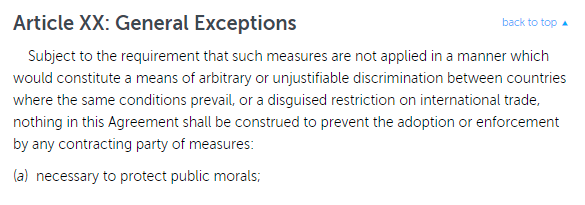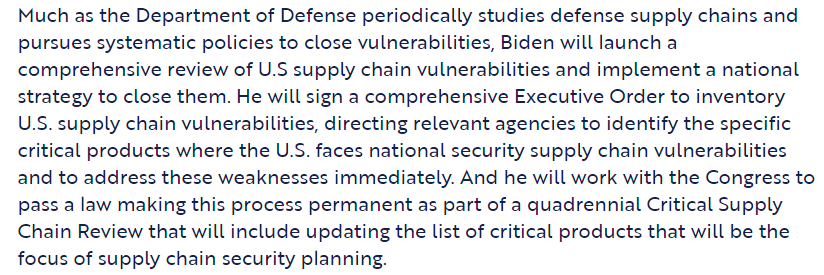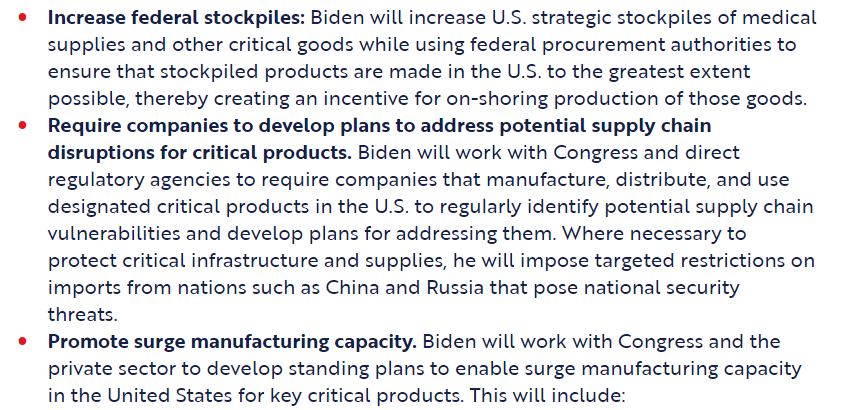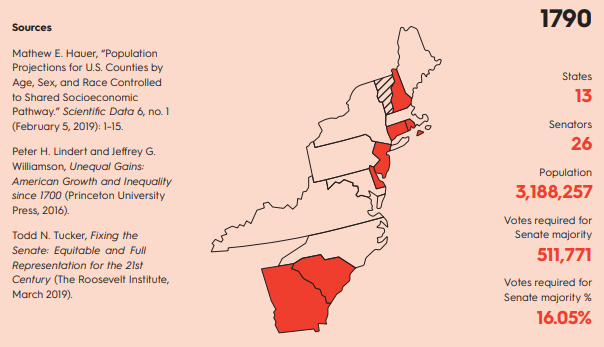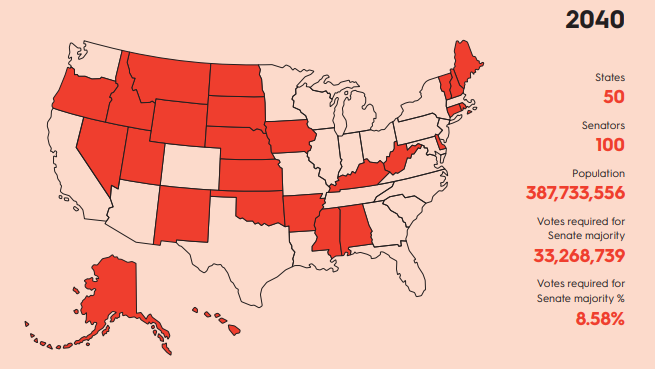
The Senate will vote later today to confirm Amy Coney Barrett as the sixth right-wing justice on a Supreme Court that is already historically pro-corporate.
This is just the latest in a crisis of democracy fed by and feeding multiple crises.
Mega Thread
cnn.com/2020/10/26/pol…
This is just the latest in a crisis of democracy fed by and feeding multiple crises.
Mega Thread
cnn.com/2020/10/26/pol…
American government has become increasingly counter-majoritarian.
The Republican Party is on track by the end of 2020 to pick 67 percent of the life-tenured justices but only win the popular vote in 12 percent of the last eight presidential elections.
rooseveltinstitute.org/2020/09/23/his…
The Republican Party is on track by the end of 2020 to pick 67 percent of the life-tenured justices but only win the popular vote in 12 percent of the last eight presidential elections.
rooseveltinstitute.org/2020/09/23/his…
Further, 18 percent of the population picks a majority of the Senate that will confirm Amy Coney Barrett. Over four million Americans in DC and the US territories have no say over the Senate (and by extension, the Court) at all. Read @jbouie for more.
nytimes.com/2019/05/10/opi…
nytimes.com/2019/05/10/opi…
As @PaulBlu and @Robillard note, that structure systematically over-represents White Americans and underrepresents Black Americans.
huffpost.com/entry/senate-u…
huffpost.com/entry/senate-u…
The Electoral College – whereby states matter more than citizens – gives small states outsize influence and serves to suppress voter participation in states that are reliably blue or red. No other advanced democracy has such an institution.
link.springer.com/article/10.100…
link.springer.com/article/10.100…

As @RonBrownstein notes, “Though Republican nominees have won the popular vote only once in the five presidential elections since 2000, the GOP has controlled the White House for 12 of the 20 years since then.”
edition.cnn.com/2020/08/11/pol…
edition.cnn.com/2020/08/11/pol…
The lower courts are just as tilted. As @scotusreporter and @seungminkim note, "There are no vacancies on the circuit court level, where approximately 30 percent of those on the bench have been nominated by Trump – who lost the popular vote."
https://twitter.com/scotusreporter/status/1320726653375516673
Republican governors and legislatures from Arizona to Georgia have expanded the size of state supreme courts to entrench their rule, as @EricLevitz notes.
nymag.com/intelligencer/…
nymag.com/intelligencer/…
And as @EJDionne @TakeBacktheCt have flagged, this right-wing dominance influences how the courts at various levels vote on democracy itself, with GOP judges voting to impede ballot access at two times the rate of Democratic appointees.
https://twitter.com/EJDionne/status/1320698762189328387
These counter-majoritarian features have led political scientists @levitsky2 and @dziblatt, who literally wrote the book on “How Democracies Die”, to warn that “In our political system, however, the majority does not govern. “
https://twitter.com/dziblatt/status/1319807479132413952
The crisis of democracy on its own would be bad enough. But it’s made worse by and makes worse the other challenges we face: COVID, inequality, the climate crisis, and systemic racism.
A response to COVID at scale will require executive branch agencies to move quickly on vaccines, commandeering supply chains, etc. Yet right-wing justices embrace judicial theories that make it harder for Congress to delegate authority for them to do so.
washingtonpost.com/politics/2019/…
washingtonpost.com/politics/2019/…
Ditto the economic recovery that is worsening inequality. Justices during the Lochner era (the so-called “originalists” of their day) blocked much of the early New Deal’s response to the Great Depression. Barrett could help do so again, per @imillhiser
vox.com/21497317/origi…
vox.com/21497317/origi…
This judicial philosophy will also make it very difficult to address the climate crisis, as @JodyFreemanHLS points out here
https://twitter.com/JodyFreemanHLS/status/1318990863050043393
Climate-induced changes in state population patterns will lead to worsening inequalities in the Senate, going from a 67-to-1 discrepancy between the power of the least to the most populous state, to 154-to-1 by the end of the century.
rooseveltinstitute.org/publications/f…
rooseveltinstitute.org/publications/f…

These judicial and Senate veto points will in turn empower economic veto points represented by carbon-intensive industries, as @JeffDColgan @greenprofgreen @thomanhale project out here
papers.ssrn.com/sol3/papers.cf…
papers.ssrn.com/sol3/papers.cf…
Fourth, as @ElieNYC reminds us, the right-wing elements on the Court have been busy shredding the Civil Rights Act and Voting Rights Act, all which entrench systemic racism and White minority rule as the country become majority people of color.
thenation.com/article/societ…
thenation.com/article/societ…
Luckily, there are steps we can take to begin the process of building democracy back better, and in the process improve our ability to address existential threats.
We can expand the number of justices so that the composition of the Court reflects the country – something that is constitutional, can be done by majority vote in the House and Senate, and has been done repeatedly at moments of crisis.
rooseveltinstitute.org/publications/o…
rooseveltinstitute.org/publications/o…
We can appoint labor lawyers instead of corporate lawyers to these new seats, as @WeDemandJustice call for here:
demandjustice.org/supreme-court-…
demandjustice.org/supreme-court-…
We can strip the Court of jurisdiction to hear cases over matters affecting the key existential crises, as @samuelmoyn and @rddoerfler call for here.
papers.ssrn.com/sol3/papers.cf…
papers.ssrn.com/sol3/papers.cf…
This has precedent in other countries, some of whom strip the normal courts of the ability to hear cases affecting unions and labor.
rooseveltinstitute.org/publications/s…
rooseveltinstitute.org/publications/s…
We can eliminate the filibuster, which we have already done for SCOTUS nominees. Indeed, that’s how Barrett is even sailing through. We could do that for good things, like de-carbonization.
rooseveltinstitute.org/publications/f…
rooseveltinstitute.org/publications/f…
We can give Senate representation to DC and the territories, with statehood for those that want it or without it for those that don’t. And we can honor treaty commitments to give Native Americans dedicated congressional representation.
politico.com/interactives/2…
politico.com/interactives/2…
We can institute ranked choice voting and a Popular Vote Compact, as @leedrutman outlines here
vox.com/polyarchy/2019…
vox.com/polyarchy/2019…
We can root out corruption (both legal and ideological), as @hitchop and @jmargetta outline here
rooseveltinstitute.org/publications/u…
rooseveltinstitute.org/publications/u…
We can fix disparities in how enforcement dollars are allocated, so that the interests of working people are centered, as @awh @deepak_bhargava argue here
democracyjournal.org/magazine/speci…
democracyjournal.org/magazine/speci…
And while we’re at it, we can improve the way we evaluate policies so that decarbonization and union strengthening are facilitated rather than hindered, as @ddayen @rdnayak @kalhartp @sharblock @tphillips and I call for here
prospect.org/day-one-agenda…
prospect.org/day-one-agenda…
This democracy agenda is popular, as @EthanBWinter @SeanMcElwee @jnoisecat @DataProgress have consistently shown
dataforprogress.org/blog/2020/8/13…
dataforprogress.org/blog/2020/8/13…
Indeed, ambitious policy that a strengthened democracy could implement is itself popular, as @EmmaSpecter @rgunns note here.
vogue.com/article/why-20…
vogue.com/article/why-20…
That’s the low-hanging fruit of stuff that’s constitutional. But a more comprehensive approach would make it easier to modernize the Constitution itself
@Camila_Vergara has inspiring ideas for doing so in her new book Systemic Corruption. Highly recommend
press.princeton.edu/books/hardcove…
@Camila_Vergara has inspiring ideas for doing so in her new book Systemic Corruption. Highly recommend
press.princeton.edu/books/hardcove…
And any solution to our domestic democracy will need a new approach to how we manage globalization, as @trevorcsutton @AndyGreenSF of @amprog argue here
https://twitter.com/DemJournal/status/1318936841731571712
If this seems like a big lift, that’s because it is.
But as @FeliciaWongRI told @ThePlumLineGS, if progressives are hoping to push for ambitious governmental reforms of the economy, it will be a nonstarter unless they credibly represent a “government that actually works better for the public good.”
washingtonpost.com/opinions/2019/…
washingtonpost.com/opinions/2019/…
And fixing US democracy so we can regulate better can help address the global climate crisis.
Carbon emissions from US-based companies’ overseas operations would rank as the 12th largest emitter, more than any European nation – as work by @cadarso_maria @zafrilla_jorge @OrtizM_Research and others show. Getting the US in order has spillover benefits
nature.com/articles/s4146…
nature.com/articles/s4146…
Finally, these structural fixes will (eventually) lower the winner-take-all arms race nature of US elections and force both sides to compete for working people's votes.
In the short run, per @Jacob_S_Hacker and Paul Pierson, the side with the unpopular ideas will continue to escalate. It can't be a one-sided fight, especially with principled fixes on hand that will improve lives. END
wwnorton.com/books/97816314…
wwnorton.com/books/97816314…
On Medium: "Barrett Fight Sets Stage for Modernizing US Democracy"
medium.com/@toddntucker/b…
medium.com/@toddntucker/b…
And for a podcast exploration of these themes, check out madetofail.org by @LauraHatsky @stephsterlingdc and crew.
To plug into action, check out @IndivisibleTeam
To plug into action, check out @IndivisibleTeam
• • •
Missing some Tweet in this thread? You can try to
force a refresh

